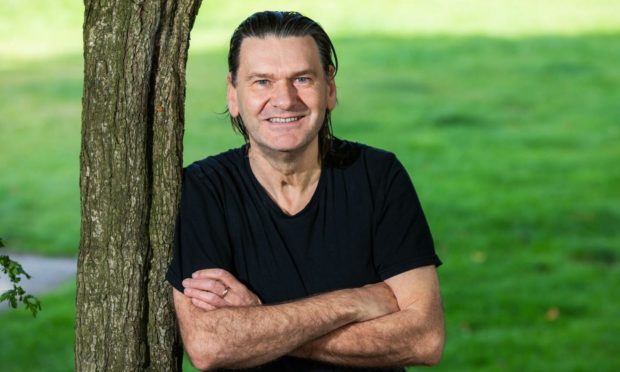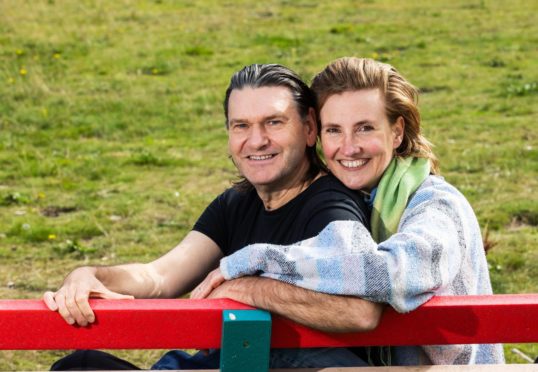Brian Keeley was just 50 when he suffered a heart attack while enjoying an island holiday with his now-wife.
It came “completely out of the blue” and Mr Keeley also suffered renal and respiratory failure, and a stroke.
It took more than three months in intensive care before he was even fit enough to be considered for a transplant.
His condition was so serious that arrangements were even made for him to marry his partner Bibo.
Now Mr Keeley is keen to get more people talking about organ donation, and ensure they have opted-in – or out – to help save lives.
As part of an awareness raising week, Organ Donation Scotland, is urging people to “make it, record it, share it – leave no doubt” about their choice.
‘Completely out of the blue’
Mr Keeley, from Aberdeen, was on holiday in Islay when he took ill eight years ago.
He was airlifted to the Golden Jubilee National Hospital near Glasgow, where he remained in intensive care for months.
“I had no previous heart condition or anything, so the heart attack came completely out of the blue. I only began to realise what had happened some weeks later, when the medical team began to bring me out of sedation,” Mr Keeley said.
“My condition was so poor that we reached a point where palliative care was introduced, but fortunately things finally began to turn around – I came off the ventilator and my kidney function returned.”
‘A life-changing experience’
Mr Keeley ‘s condition was so precarious that hospital staff arranged for him to marry in the hospital, and thanks to the transplant, he is now looking forward to celebrating his eighth wedding anniversary.
“By late September, I was only expected to survive a matter of days so we got married in the intensive care unit,” he said.
“The transplant just over a month later meant that we have now had another eight years together, and those eight years have only been possible through organ donation – so it could not be more important to our lives.”
He was listed for a transplant in mid-October and had the transplant surgery just two weeks later.
He continued: “There’s so much discussion about being on the waiting list, but what I think a lot of people don’t know is that there’s also many people out there, in the situation that I was in, who aren’t yet on the waiting list as they’re trying to get well enough to be able to survive the procedure.
“Having a transplant is a life-changing experience. You can recover from the operation itself relatively quickly, but your life thereafter is totally transformed.
“Post-transplant, I was still in intensive care, and the only real difference was that I didn’t have the pump-machine attached to me that was supporting my heart function, which meant that I could begin to get out of bed and learn to walk again.
“The transplant was really the turning point in my recovery and the exit was finally in sight.”
Share your decision
The opt out system for organ donation was introduced on March 26 this year and means all people over the age of 16 will be considered a possible donor if they have not decided to opt out.
The system was introduced to “save and improve lives” and gives everyone a choice, to be a donor if they die in circumstances that allow donation or to opt out, but it is important to make your decision known either way.
The law does not apply to some groups but for all others who choose to do nothing, it will be presumed that they have agreed to donate organs and tissues for transplantation.
Mr Keeley added: “If you wish to be a donor just make sure you register and share your views with those closest to you.
“I had been an organ donor card carrier since I was a teenager, but when I was younger I always assumed I was more likely to become a donor than a recipient.
“For a long time after my heart transplant, my priority was just trying to get through recovery, and for everyone involved throughout the process, I have a sense of gratitude that is beyond words.”
Anyone who is looking for more information on the law change and to record a donation decision can visit the Organ Donation Scotland website.

